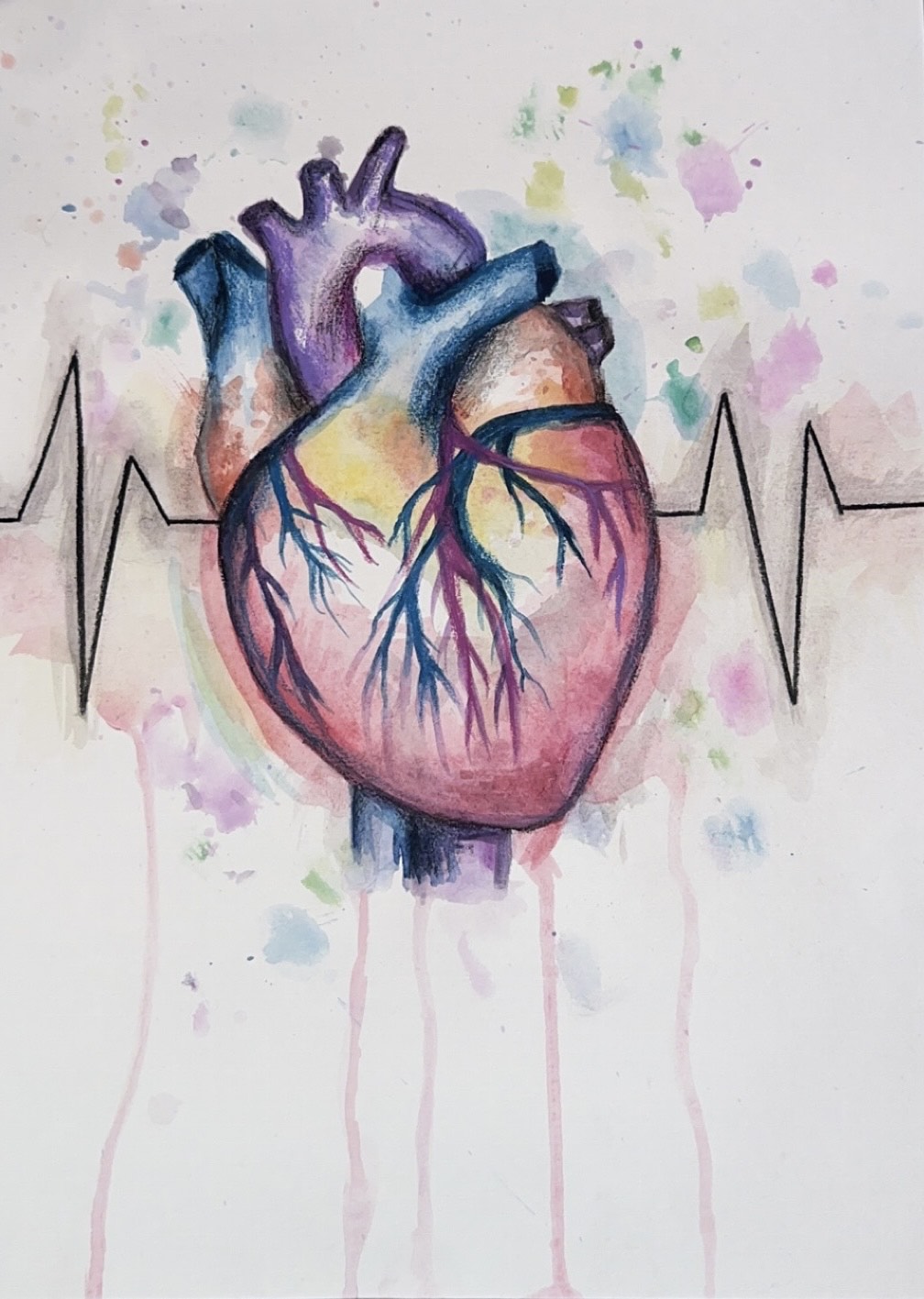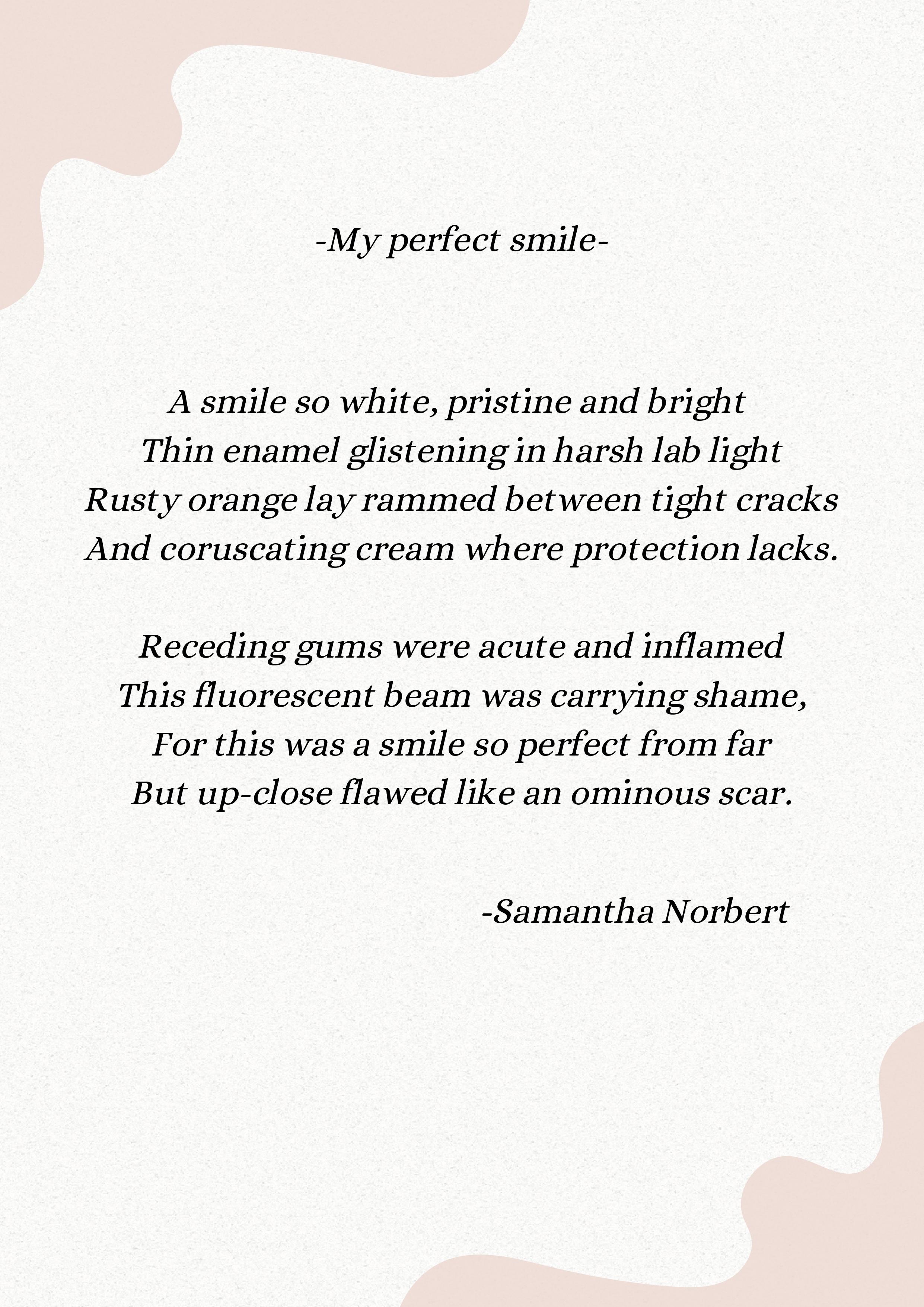- 1st Place: Mahira Purna
- 2nd Place: Samantha Norbert
- 3rd Place: Emmanuella Imoh

After having learnt about the heart in my biology lessons this year, alongside the 5-day webinar series on cardio thoracic surgery that I attended, my fascination towards the heart blossomed as felt the longing urge to portray this vital, yet beautiful organ with an explosion of fluorescent colours, combining my love for both anatomy and painting. Not only this but also the biology behind it all is so captivating to learn about! How the heart pumps blood around our bodies, how the atria and ventricles contract, and how the coronary arteries are essential in supplying oxygen for muscle contraction and more!
The arteries and veins are connected by small capillaries allowing each to deliver oxygenated blood from the heart to the rest of the body and to retain deoxygenated blood from the body back into the heart, respectively. The right atrium is the one that receives deoxygenated blood that has returned from the body which then pumps this blood into the right ventricle which then pumps it into the lungs to pick up a fresh supply of oxygen. The left atrium receives this oxygenated blood from the lungs and pumps it to the left ventricle which then pumps this blood to the rest of the body. This is a one way system and valves are the ones that regulate the direction of blood flow. They act like doors that open and close with every heartbeat! The pulmonary valve being on the right and the aortic valve being on the left side of your heart.
After attending the five day lecture series, I gained valuable knowledge about the procedures undergone during cardiothoracic surgery. I was privileged enough to hear a consultant speak about her regime and I learnt how a multidisciplinary team is essential within this field of medicine as a patient in need of cardiac surgery will require surgeons and cardiologists to work together in order to ensure the best treatment and outcome possible for the patient.
Moreover, I find it enthralling how an organ that can often represent love, sadness or joy and other strong emotions in literature and music, is the same organ that keeps us alive. I wanted my painting to show the heart like how my eyes see it, a vibrant and attractive entity that is not only multifunctional, but can have several connotations, representing certain aspects in the bigger picture of human life on paper and through the use of rhythm, melodies and words. In my personal life, I have experienced these strong emotions multiple times, however the one that stands out to me the most is when I went through grief due to the loss of a loved one. Such overwhelming sadness can even cause physical pain in the chest, when our heart palpitations increase and the heartbeats begin to sound like a song of worry, suggesting that the heart is possibly more than just a blood pumper and is without a doubt, one of the most unique organs in the human body!

Presenting at the open day at my new school was stressful. I voluntarily put myself forward to represent my school. In spite of this, I had not yet realised how unprepared I was for this event until the first group approached me. I felt my heart racing and my confidence in myself dissipated. I blundered hard with our first visitors and this led to a cascade of degrading emotions about myself, bringing about thoughts that I had not only disgraced myself but my school also.
As well as this I found being in goggles strangely made me feel separated from my true self as being behind them made my experience seem surreal and when the presence of visitors grew lengthy I felt awkward and uncomfortable.
I recovered from my mistakes, gradually. I adapted and learned how to communicate with visitors effectively; growing in confidence. Therefore I felt more relaxed and that my natural character was easing back into place. In my progress I discovered that I was at my best when talking about areas that I knew well and in this managed to give insight to visitors on new things they had not heard of before. Following this I found that working with a teammate instilled me to realise that I am great with teamwork skills and also encouraged me as they told me that they felt nervous too. It made me realise that nerves are normal and that I just need to learn to have control over my emotions and not let it ruin my performance
I have discovered that my problem at the start of this event was that I lacked confidence in myself. Being in a new school with substantially higher standards than my previous school, made me feel pressure. I was also new to this sort of activity and had not put much thought into what might happen.
Through this experience I have learned that I need to have confidence in myself and believe that I am capable. I also found that the power of basic principles in life such as believing in yourself and being yourself is something that is truly underestimated. I believe if I made myself actively aware of these principles then my performance would have been much better. Additionally, rather than being concerned about myself and thoughts that individuals may have about me I should be more concerned about the true purpose of this opening day which is answering individual’s questions that they have about the school as well as making them feel welcome.
This poem is oriented towards my teeth since I feel that its elements powerfully resemble my experience while anxious during the open day. My teeth have some flaws as in the past I focused on trying to attain a perfect white smile. I attempted this by brushing my teeth vigorously and this has ultimately led to neglect in other valuable areas of my teeth.This reflects on how I try to put on a perfect image at open day but at the same time distance myself from my true character. This led to imperfections unveiled as I made mistakes.
Video
The first word that comes to mind when I think of doctors is compassionate. Everyone knows that doctors should always be understanding and sympathetic towards all their patients and show a genuine concern towards a patient's concerns or worries. As highlighted in my poem, Doctors should be able to effectively communicate with their patients and also be able to receive and interpret information in the communication process. These skills are gained from volunteering, working or fulfilling a leadership role at school and are also the skills that medical students try really hard to show in their personal statements. During my work experience, I saw first-hand why these skills matter so much.
Doctors always try to build a rapport with their patients. To doctors, rapport is considered an antecedent to trust, empathy and respect. During my work experience, I noted that effective rapport improves patient compliance with treatment, clinical outcomes and patient satisfaction. The doctor I shadowed always explained how doctors should be able to understand the impact of illnesses on patients and their families. After meeting multiple different patients with the doctor, I have had the opportunity to get a small insight into the value of life and the impact of illness on patients and loved ones. I hope in the future, I will not forget this lesson and ensure that I always have time for patients and that I will treat them as people and not as illnesses.
From working within the medical team, I have learnt that communication in health care underpins everything that professionals do and can also determine the quality of service that patients receive. Poor communication between patients and doctors results in increased misjudgement and shows lack of empathy. Actively listening to patients conveys respect for their self-knowledge and builds trust. It also eases any fear and anxiety the patient may have. When the doctor is evidently “fully connected” to the conversation, patients feel encouraged to share their concerns, disclose sensitive information, and ask questions. Patients who feel at ease will often be more vocal and open to sharing their deepest concerns which will result in better care. I’ve noticed that a good listener makes eye contact with the patient, smiles, and offers kind words throughout the conversation rather than fiddling with a pen or shuffling through a notepad. Thus, I made it a personal objective to try and avoid these behaviours and show my full attentiveness and genuine concern towards every conversation with a patient.
The overarching theme of my poem is building a rapport with a patient. Throughout my poem, I highlighted the certain skills doctors have that allow them to effectively build a good relationship with the patient. My clinical work experience provided me with the opportunity to observe these skills being put into practice and understand the importance that these skills have in a clinical setting. I am confident that in the future I can effectively demonstrate these skills as a doctor and ensure that my patients receive the best quality of care.